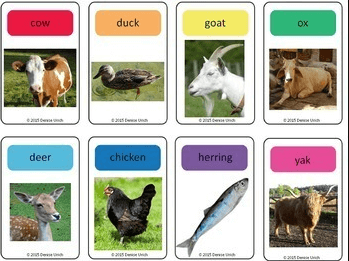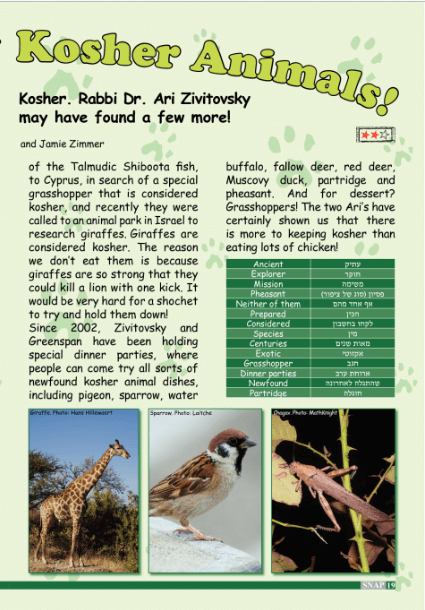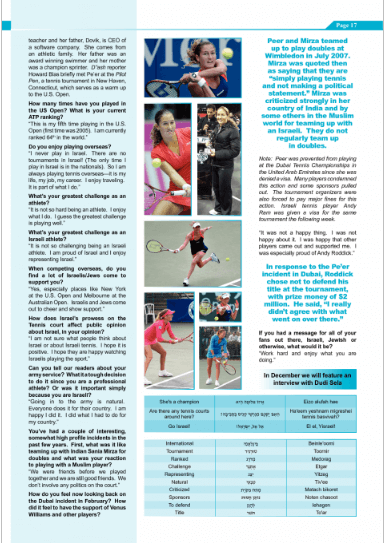Original article published on the Jerusalem Post, Jerusalem Post Children’s Articles
Last month we brought you Shahar Peer. This month, the spotlight is on Dudi Sela, Israel’s leading male tennis champion.
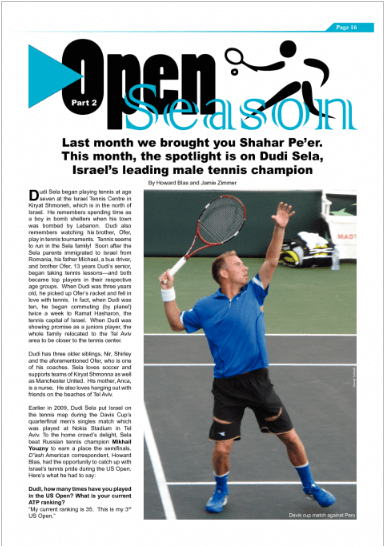
Dudi Sela began playing tennis at age seven at the Israel Tennis Centre in Kiryat Shmoneh, which is in the north of Israel. He remembers spending time as a boy in bomb shelters when his town was bombed by Lebanon. Dudi also remembers watching hisbrother, Ofer, play in tennis tournaments. Tennis seems to run in the Sela family! Soon after the Sela parents immigrated to Israel from Romania, his father Michael, a bus driver, and brother Ofer, 13 years Dudi’s senior, began taking tennis lessons—and both became top players in their respective age groups. When Dudi was three years old, he picked up Ofer’s racket and fell in love with tennis. In fact, when Dudi was ten, he began commuting (by plane!) twice a week to Ramat Hasharon, the tennis capital of Israel. When Dudi was showing promise as a juniors player, the whole family relocated to the Tel Aviv area to be closer to the tennis center.
Dudi has three older siblings, Nir, Shirley and the aforementioned Ofer, who is one of his coaches. Sela loves soccer and supports teams of Kiryat Shmonna as well as Manchester United. His mother, Anca, is a nurse. He also loves hanging out with friends on the beaches of Tel Aviv.
Earlier in 2009, Dudi Sela put Israel on the tennis map during the Davis Cup’s quarterfinal men’s singles match which was played at Nokia Stadium in Tel Aviv. To the home crowd’s delight, Sela beat Russian tennis champion Mikhail Youzny to earn a place the semifinals. D’ash American correspondent, Howard Blas, had the opportunity to catch up with Israel’s tennis pride during the US Open. Here’s what he had to say:
Dudi, how many times have you played in the US Open? What is your current ATP ranking? My current ranking is 35. This is my 3rd US Open.
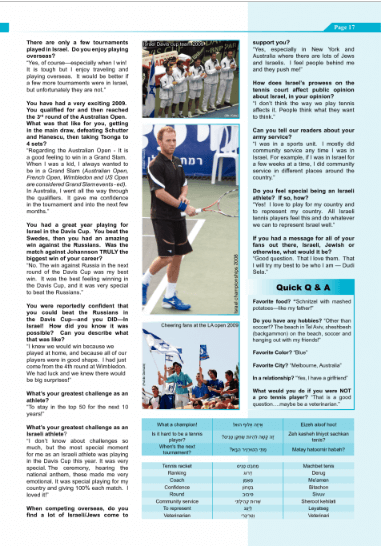
There are only a few tournaments played in Israel. Do you enjoy playing overseas? Yes, of course especially when I win! It is tough but I enjoy traveling and playing overseas. It would be better if a few more tournaments were in Israel, but unfortunately they are not.
You have had a very exciting 2009. You qualified for and then reached the 3rd round of the Australian Open. What was that like for you, getting in the main draw, defeating Schutter and Hanescu, then taking Tsonga to 4 sets? Regarding the Australian Open – It is a good feeling to win in a Grand Slam. When I was a kid, I always wanted to be in a Grand Slam (Australian Open, French Open, Wimbledon and US Open are considered Grand Slam events – ed). In Australia, I went all the way through the qualifiers. It gave me confidence in the tournament and into the next few months.
You had a great year playing for Israel in the Davis Cup. You beat the Swedes, then you had an amazing win against the Russians. Was the match against Johannson TRULY the biggest win of your career? No. The win against Russia in the next round of the Davis Cup was my best win. It was the best feeling winning in the Davis Cup, and it was very special to beat the Russians.
You were reportedly confident that you could beat the Russians in the Davis Cup and you DID In Israel! How did you know it was possible? Can you describe what that was like? I knew we would win because we played at home, and because all of our players were in good shape. I had just come from the 4th round at Wimbledon. We had luck and we knew there would be big surprises!.
What’s your greatest challenge as an athlete? To stay in the top 50 for the next 10 years! What’s your greatest challenge as an Israeli athlete? I don’t know about challenges so much, but the most special moment for me as an Israeli athlete was playing in the Davis Cup this year. It was very special. The ceremony, hearing the national anthem, these made me very emotional. It was special playing for my country and giving 100% each match. I loved it!.
When competing overseas, do you find a lot of Israeli/Jews come to support you? Yes, especially in New York and Australia where there are lots of Jews and Israelis. I feel people behind me and they push me!.
How does Israel’s prowess on the tennis court affect public opinion about Israel, in your opinion? I don’t think the way we play tennis affects it. People think what they want to think.
Can you tell our readers about your army service? I was in a sports unit. I mostly did community service any time I was in Israel. For example, if I was in Israel for a few weeks at a time, I did community service in different places around the country.
Do you feel special being an Israeli athlete? If so, how? Yes! I love to play for my country and to represent my country. All Israeli tennis players feel this and do whatever we can to represent Israel well.
If you had a message for all of your fans out there, Israeli, Jewish or otherwise, what would it be? Good question. That I love them. That I will try my best to be who I am Dudi Sela.
Favorite food? Schnitzel with mashed potatoes like my father!.
Do you have any hobbies? Other than soccer!? The beach in Tel Aviv, sheshbesh (backgammon) on the beach, soccer and hanging out with my friends!.
Favorite Color? Blue.
Favorite City? Melbourne, Australia.
In a relationship? Yes, I have a girlfriend.
What would you do if you were NOT a pro tennis player? That is a good question….maybe be a veterinarian.

